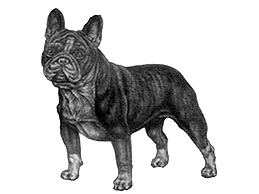Breed standards
French Bulldog
Breed standards are the official guidelines that describe the ideal characteristics, temperament, and appearance of a breed and ensures that the breed is fit for function with soundness essential.

Kennel Club, London 1994
Amended August 2015
Sturdy, compact, solid, small dog with good bone, short, smooth coat. No point exaggerated, balance essential. Dogs showing respiratory distress highly undesirable.
Full of courage, yet with clown-like qualities. Bat ears and short tail characteristic features of the breed.
Vivacious, deeply affectionate, intelligent.
Head square in appearance and in proportion to dog’s size. Skull nearly flat between ears, domed forehead. The skin covering the skull and forehead should be supple enough to allow fine wrinkling when the dog is alert. Well defined muzzle, that can clearly be viewed in profile, broad, deep and set back, muscles of cheeks well developed. Stop well defined. Lower jaw deep, square, broad, slightly undershot and turned up. Nose black and wide, relatively short, with visibly open nostrils and line between well defined. Lips black, thick, meeting each other in centre, completely hiding teeth. Upper lip covers lower on each side with plenty of cushion, never so exaggerated as to hang too much below level of lower jaw.
Preferably dark and matching. Moderate size, round, neither sunken or prominent, showing no white when looking straight forward; set moderately wide apart and on the same level as the stop.
“Bat ears”, of medium size, wide at base, rounded at top; set high, carried upright and parallel, a sufficient width of skull preventing them being too close together; skin soft and fine, orifice as seen from the front, showing entirely. The opening to the ear canal should be wide and open.
Slightly undershot. Teeth sound and regular, but not visible when the mouth is closed. Tongue must not protrude.
Powerful, well-arched, of moderate length.
Legs set wide apart, straight boned, strong, muscular and short.
Cobby, muscular and well rounded with deep, wide brisket and ribs well sprung. Strong, gently roached back. Good cut up. The body while broader at the shoulders should narrow slightly beyond the ribs to give definition to the relatively short, thick, strong, muscular loin.
Legs strong, muscular and relatively longer than forelegs, with moderate angulation. Absolute soundness essential. Hocks well let down.
Small, compact and placed in continuation of line of leg, with absolutely sound pasterns. Hind feet rather longer than the fore-feet. Toes compact; well knuckled; nails short, thick and preferably black.
Undocked, set low. Thick at root, tapering quickly towards tip, preferably straight and long enough to cover anus. Never curling over back no carried gaily.
Free and flowing. Soundness of movement of the utmost importance.
Texture fine, smooth, lustrous, short and close.
The only correct colours are: Brindle; Fawn; Pied;
Brindle – Colour pattern caused by a mixture of black hairs and fawn hairs. White markings permitted provided that brindle predominates. Eye rims, eyelashes and lips black.
Fawn – Clear, self-coloured fawn with or without a black mask. White markings permitted, provided that fawn predominates. Cream and red shades less desirable. Eye rims, eyelashes and lips black.
Pied – Brindle Pied: White predominates with brindle patches. (The brindle as defined above). Fawn Pied: White predominates with fawn patches.
Whites are classified with pieds for show purposes.
In pieds, eye rims, eyelashes and lips should preferably be black.
Any white in the above colours should be clear with no ticking or spots.
All other colours highly undesirable, including solid black, black and white, black and tan, mouse, grey/blue, liver/chocolate and all patterns of these colours.
Ideal weight:
Dogs 12.5 kgs (28 lbs)
Bitches 11 kgs (24 lbs)
Soundness not to be sacrificed to smallness.
Any departure from the foregoing points should be considered a fault and the seriousness with which the fault should be regarded should be in exact proportion to its degree and its effect upon the health and welfare of the dog and on the dog's ability to perform its traditional work.
Male animals should have two apparently normal testicles fully descended into the scrotum.



